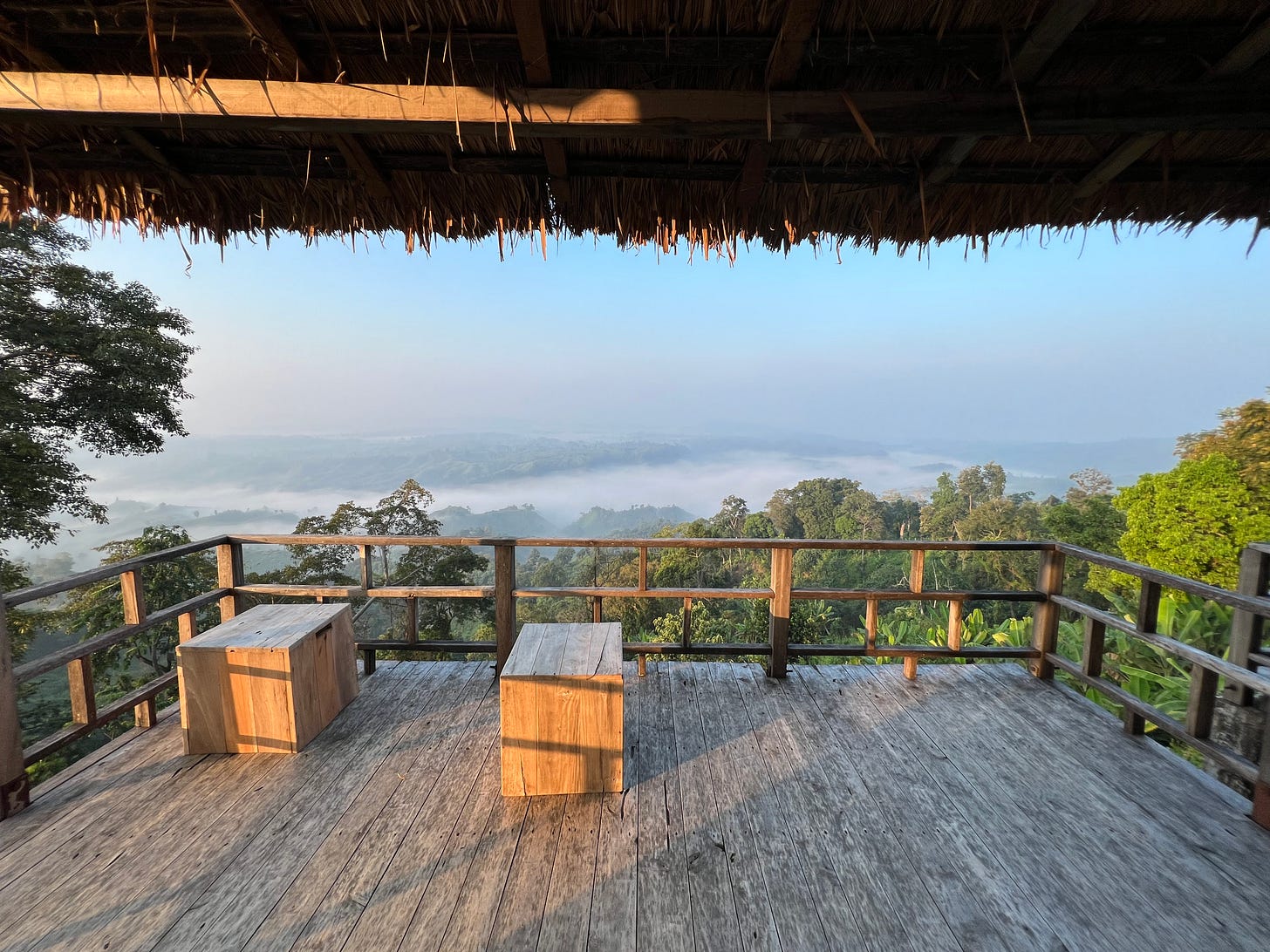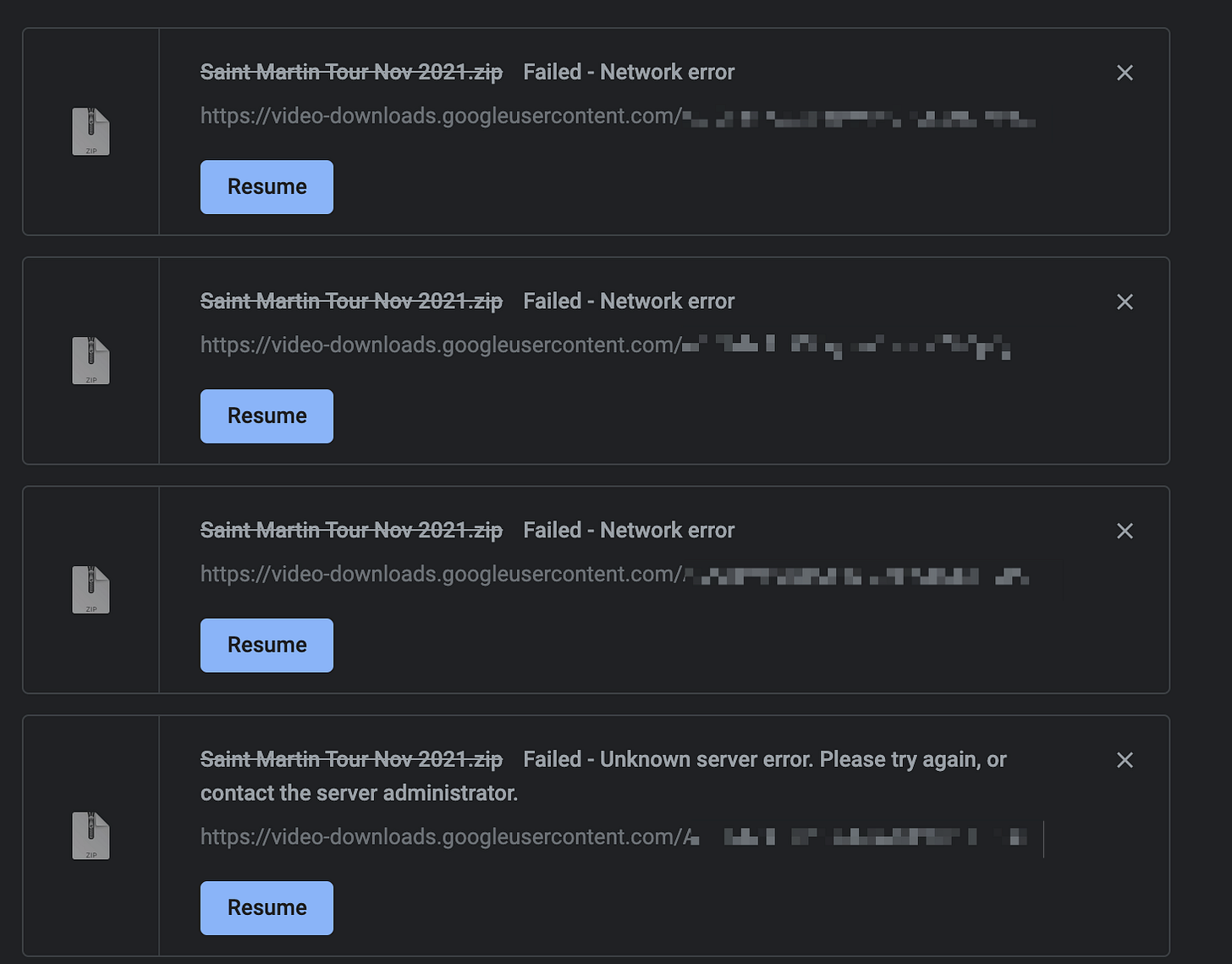Letter #6 📱 Drowning in Digital Mess
What happens after you've shot too many videos on a trip
November has been different. I don’t remember the last time I spent an entire month doing practically nothing but travel. The first half of November, I was bored at home while planning the trips, and the other half, I was out enjoying them.
Before my trips began, I started researching how to record my travel stories. I’d always shoot photos on my phone and with the DSLR camera. This time, I wanted to do something different and shoot short videos to stitch together and make a short travel film. I don’t like vlogging, so the video would have no narration. It would complement blog posts where I’d write about the trips in greater detail.
I spent a lot of time researching video gear. My main camera now is the Canon EOS R, the company’s first real full-frame mirrorless camera. I’ve also accumulated a small number of native RF lenses -- which Canon made exclusively for the R series camera. However, the lenses I have aren’t that comfortable for video work, and because they are pretty heavy, I’d need a gimbal of some sort to record any usable shots.
Also, I didn’t want to use the same camera for both photos and videos, even though they are perfectly capable of doing so.
I looked at the Sony system for some time. Sony’s mirrorless line-up has a great selection of camera bodies and lenses since they’ve been around for longer. However, the upfront cost of entering into a new camera system swayed me.
I decided a better smartphone camera would fit my needs perfectly. It’d always be with me, and I could just record some videos anytime I wanted without needing to use a gimbal.
Meet the iPhone 13 Pro. With its fantastic array of cameras, their low-light capabilities, smooth stabilization, and not to mention incredible video quality, it was a no-brainer purchase decision for me.
During the trip, I shot more videos than photos. I did snap many pictures to compare the Pixel 6 and the iPhone 13 Pro cameras (I’m writing detailed reviews, so don’t forget to subscribe if you haven’t already). Still, I mostly shot videos on both cameras (spoiler: iPhone 13 Pro shoots better videos than the Pixel 6).
I use Google Photos, so all my Pixel 6 and iPhone shots are uploaded to the cloud. The plan was to come back home, create separate albums for the trips, download the photos and videos, and delete the videos from Google Photos.
Why would I delete the videos? Well, at 4K resolution, they take up a lot of space. (To give you an idea, before the trip, I had used about 20-30 GBs of storage on Google Photos. After the trip, I have used up nearly 70 GBs of storage.)
I don’t need to keep all those small video clips. Once I have them all downloaded locally, I’d create the video, delete the clips from the cloud, and upload the finalized video to the trip album.
Unfortunately, things aren’t going as planned.
I’ve created the albums on Google Photos, but the download is repeatedly failing for some reason (probably a large number of videos are to blame). I’ve been trying to download the gallery for the past three days, and they are constantly failing. After many attempts, I’ve managed to download one gallery, but the rest are still failing. I’m not convinced it’s my internet connection, but it very well could be. (It fails on my backup connection too).
I could transfer all media from iPhone and Pixel to the computer directly, but then I’d have to manually figure out which photos and videos belong to which location and spend another eternity organizing them.
As if that wasn’t enough, I also have photos shot on the EOS R that are scattered across multiple SD cards. As you can guess, having to organize this whole mess of media feels like a full-time job on its own. Though I have nothing else to do at this time, I’m still procrastinating because I have this huge digital mess to clean up and organize first.
I’m now questioning my decision to do everything on the smartphone. On the one hand, it’s easy to shoot and forget. On the other hand, the post-trip organization is a tedious task. Plus, I run the risk of running out of cloud storage if I shoot too many videos. The bandwidth needed to upload and download all these media is another concern that I forgot to think about in advance.
If you have some tips for better organizing all these media from different smartphones and cameras, please share them with me. Until then, I will need to rethink how I organize the media files on the go.
The plan is to transfer the files from all three devices to their relevant folders on an external storage device every night so that I wouldn’t have all this mess at the end of several trips.
Hopefully, I’ve learned my lesson and will do a better job organizing on my next trip.
📖 Interesting Reads
💰 How I got wealthy without working too hard
I liked many of the points discussed in this article. I’m not sure about the ‘easier than ever to become a millionaire’ claim, but the author has some great points that are worth reading, even if you don’t fully agree with them (like the part about not doing a start-up).
However, it’s aimed at “software developers” (understandably so), which can be a bummer for some in other professions. I’m not a software developer either, so naturally, I don’t have as many opportunities as software developers do, but with the world embracing the remote-first culture, more and more jobs are going remote.
If your work can be done on a computer and delivered via the internet, there’s a high chance that you can do it remotely.
📝 Writing In Public, Inside Your Company
This is a different topic, but it relates heavily to the remote work discussed in the previous article.
Zoom calls may come and go, but remote work thrives on a culture of written communication. I understand that I may be biased as I prefer written communication (I find video calls exhausting and not particularly the best representation of the work that I’d actually do, which is via writing).
But even then, a culture of writing can have significant benefits for your company, even when everyone isn’t a writer.
At Automattic, for example, one of our main tools for communication is what we call P2. You can learn more about P2 as a collaborative communication tool here, but fundamentally, even outside of Slack, Github, and a myriad of other tools used by different teams, we all use P2s, and we all write.
I highly recommend giving the post a read.
🎬 Noteworthy Watch
🚂 Murder on the Orient Express
I read Agatha Christie’s classic not too long ago. Because I didn’t spend my childhood reading English books, there’s a lot of classic books that I’m yet to read. I was glued to the book until the very end, and despite not understanding some of the intricate details due to language barriers, I enjoyed it a lot.
I read recently about the real Orient Express in a National Geographic article (in which I also learned that the train truly did get stuck in the snow, so the book was written in the background of actual incidents). That’s when I found out that there were two movie adaptations of this book. I watched the one that came out in 2017, and I thoroughly enjoyed it.
I won’t get into the age-old ‘book vs. movie’ debate, but there were some changes in the movie. Detective Poirot’s personality in the movie felt quite different from the book, but I loved it.
When watching the movie, I kept wondering how Agatha Christie might have reacted to the improvisations made to the movie. She was still alive when the 1974 version was released, and she reportedly was not pleased with how the Poirot’s mustache looked.
She might not have appreciated the changes in the story (and in Poirot), but if viewers (excluding die-hard fans) love the improvisations, does it matter what the author feels?
As someone who dabbled in writing fiction a few times in the distant past, I wonder if any author ever owns a character or their storyline once it’s out in the world.
It also reminded me of my belief that there’s always room for improvement in written material (not just fiction).
The author has to feel like they’ve done their best and publish the material at a certain point. But someone can always edit and make it better.
Do I feel like this is the best version of this newsletter that I could have written? Honestly, no. But in pursuit of perfection, I fall victim to procrastination. So I tend to publish when I’m ready and not wait for perfection because it may never come.
Why? Because there’s always room for improvement.
I hope you’ve enjoyed this letter. Feel free to reply with any comments and subscribe if you haven’t yet. Quite a few Apple reviews are in the works! Don’t miss any of them!
Thank you for reading, and see you soon in the next issue of Letter.





